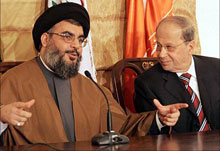A new Shiite-Maronite pact cannot work
Michael Young/The Daily Star/June. 12, 2015
How were Aounists supposed to interpret the remarks of Hezbollah’s deputy secretary-general, Naim Qassem, Monday? While in the Bekaa Valley, Qassem declared that “either Free Patriotic Movement leader Michel Aoun is elected as president, or the [election] will be delayed indefinitely.”The Aounist rank and file will have welcomed this unconditional backing for the general, which followed similar statements of praise from Qassem last Saturday. But those who are more perspicacious may have concluded, somewhat differently, that if Aoun’s candidacy has become the subject of Hezbollah brinksmanship, then the general’s chances of becoming a consensus candidate are negligible. Aside from the tactical calculations behind Hezbollah’s support for Aoun, which may be designed to maintain a vacuum in the presidency at a time of uncertainty in Syria, there appears to be a longer-term objective. It is that if the Syrian regime falls, Hezbollah’s only way to protect itself in Lebanon against Sunni triumphalism is to build a durable alliance with the Christians.
In effect what we could be witnessing today is an effort to lay the groundwork for a new “national pact,” replicating the one between Maronites and Sunnis that became the cornerstone of independent Lebanon. What Hezbollah seeks to do is protect its weapons in an environment in which its Alawite ally in Damascus is gone, and where Sunni empowerment will lead to demands against the party that can no longer be resolved through a recourse to violence as in May 2008.
Qassem and the Hezbollah leadership apparently feel that their endorsement of Aoun will help achieve two things: It will heighten Christian goodwill toward the party, as it will seem that Hezbollah wants a “strong” Maronite president; and it will rally Christians to the Shiite side against a resurgent Lebanese and Syrian Sunni community that, many Christians fear, is likely to end up being controlled by extremists.
Hezbollah’s exploitation of Christian fears to rally the community against the Sunnis is worrisome. However, recently at the 11th Congress of Sayyedat al-Jabal, Christian representatives, backed by the Maronite Church, resisted this trend. The gathering came out with a very clear statement that “the protection of the Christians is not achieved through an alliance of minorities.” Samir Franjieh recalled that the Arab League had affirmed that pluralism was the only weapon against terrorism. This view was indirectly echoed in another of the conference’s resolutions, namely that “the majority is as much a victim of terrorism as are the minorities.”But how widespread are such opinions? Even Patriarch Bechara Rai agreed with those holding the contrary view in 2011, when he approved of Bashar Assad’s regime in Syria, seeing it as a barrier against Islamism. The patriarch had made a hasty statement then that he must now regret: “It’s true that the Syrian Baath regime is an extreme and dictatorial regime, but there are many others like it in the Arab world. All regimes in the Arab world have Islam as a state religion, except for Syria. It stands out for not saying it is an Islamic state. … The closest thing to democracy [in the Arab world] is Syria.”
Rai’s foolishness aside, thanks to Assad Syria’s minorities, Christian or Muslim, have never been so existentially threatened. The belief that Hezbollah represents a credible protective barrier for Christians is nonsense. The party and Iran have barely been able to defend their strategic ally in Damascus, so those who imagine they could do so for the Christians of Lebanon really must buy a newspaper.
Hezbollah has never understood, nor sought to understand, Lebanon’s power-sharing agreement and the principles underlying the country’s consociational system. Everything for the party is measured by a yardstick of power relations. All notions of compromise and coexistence are accepted only inasmuch as they enhance, or prevent the decline of, Hezbollah’s power. Policies that might reinforce coexistence are rejected if they clash with the party’s assessment of its interests. Hezbollah’s involvement in Syria is a perfect example.
If Christians are confident about building up a foundational alliance with the Shiites – implicitly directed against the Sunni community – on the basis of Hezbollah’s worldview, then they had better prepare for a long period of sectarian conflict. The outcome in Syria remains unclear, but only a commitment by all Lebanese communities to coexistence and compromise will ward off the sectarian repercussions of the war in Syria.
Security for Lebanon’s Christians comes from pursuing close relations with both Shiites and Sunnis. Internal unity is equally essential, and the recent reconciliation between Aoun and Samir Geagea was a good start, even if nothing was agreed. Without a common plan for communal survival, Christians will be unable to navigate the rough seas ahead.
The belief in a new Maronite-Shiite national pact to replace that of 1943 reflects a misinterpretation of Lebanese history. Just as the National Pact before Independence failed to prepare for the rise of the Shiite community, a Maronite-Shiite pact would only ignore the regeneration of the Sunni community. Successful social contracts, particularly in mixed sectarian societies such as our own, are based on general principles, and cannot be constantly tailored to adapt to shifting political realities.
If Hezbollah wants to protect the Shiites, then it must accept that a new reality is taking form in Lebanon and all around it. The party cannot enlist its community in perpetual war against its surroundings and hope to win. Nor should Christians go along with such a mad, suicidal project. For once Christians have a key role to play as conciliators between Sunnis and Shiites. That’s their best safeguard against elimination.
**Michael Young is opinion editor of THE DAILY STAR. He tweets @BeirutCalling.




















